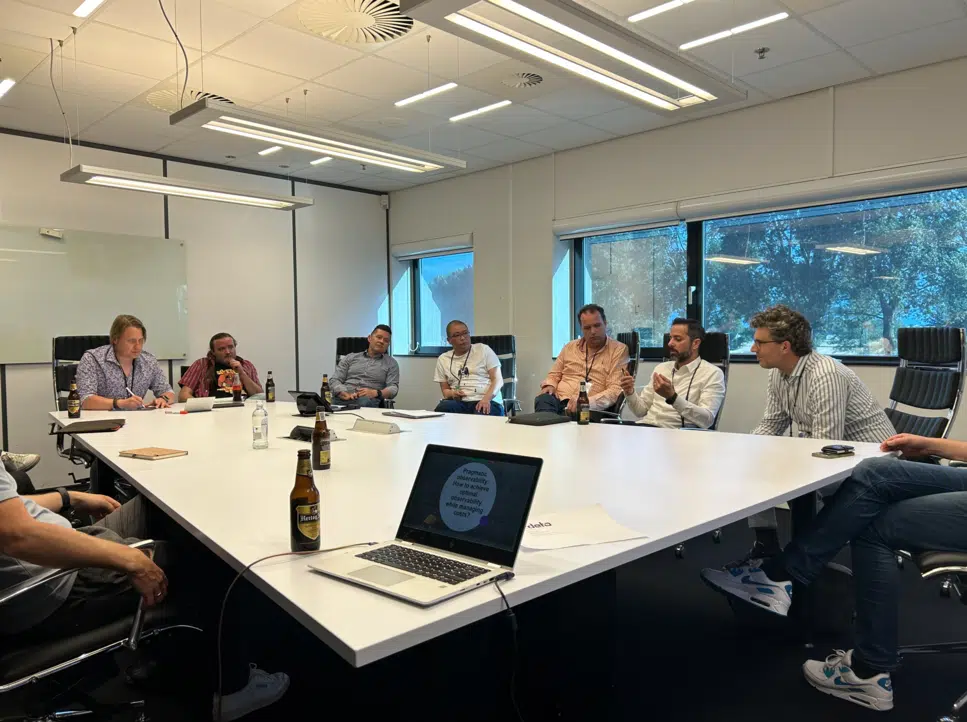We recently spoke with Joe Burridge, Senior Recruiter at Electronic Arts (EA) as part of our #TalentQA series where we interview leaders in talent management and recruitment from a range of businesses from tech startups to well-known fashion brands.
Joe talks about his YouTube channel and how sharing tips, insights and advice will transform the industry, the changes he has seen in candidate behaviours and how businesses can best react to them, and how recruiters can keep up in the increasingly digital age that we live in.
Third Republic (TR): Could you explain a bit about your time working in Talent Acquisition and how you got to where you are now?
Joe Burridge (JB): I studied philosophy at university and the reason I mention this is because even though I loved uni, ultimately, you don’t need a degree to be a recruiter. As I got towards the end of my degree realised what I wanted from my career. And this was being able to speak to people and work in the tech industry in some way – 2 things I’m passionate about. This is how I found recruitment.
My hiring career started working agency-side specialising in tech, more specifically in software engineering. I moved to in-house recruitment around 5 years ago. My first role in-house was for a sports technology company called Huddle. Whilst there I helped grow the business from around 200 employees to 1000 over around 2 and a half years. It was an amazing learning curve, they went from being in 2 countries to 14. And I was responsible for all the software engineer hiring globally.
I had always wanted to be involved in the video gaming industry, so I started networking and landed my current role at Electronic Arts (EA) just over 2 years ago. And that’s my career in a nutshell.
TR: You recently started a YouTube channel offering a range of advice from hiring tips to interview guides. Could you talk a bit about the value of interacting with your network in this way?
JB: I really started the channel because it felt like a natural next step from my blogging. Also, I enjoy it. Video editing is a hobby of mine, so it’s helping me to learn a new skill around that. But ultimately and more importantly it’s about giving back.
I’m always sharing my advice and knowledge with family and friends around interviewing and CV tips. And I realised this kind of information is really valuable to people but not so easy to find. Being a recruiter, I take this kind of advice for granted. So, it’s really about helping candidates navigate their careers in a digestible format.
I also find video is becoming more and more popular, and it’s a great avenue to reach people and interact with people within and outside of my network.
TR: You also produce blogs and articles and have featured on podcasts. How does communicating with your clients, candidates, and peers beyond the day-to-day add value both to them and you?
JB: Coming from the agency-side, but also just recruiting in general – it’s a really competitive industry. However, throughout my career, I’ve worked with lots of tech companies and I see engineers sharing ideas and techniques all the time either online or at conferences.
This got me thinking about the recruitment industry and how secretive we are in order to try and remain competitive. And I don’t really believe this. I’m of the opinion that if we all share knowledge, we’ll all be better recruiters. I like the idea of sharing our knowledge with other recruiters and candidates and clients in order to improve our industry. If we share more we’ll add value to our customers and each other.
TR: Have you noticed a change in candidate behaviours during your time in recruitment?
JB: Having education more readily available online so candidates are more easily able to learn and research. I am definitely seeing more and more candidates putting a lot more time and effort into their own brand. And if companies aren’t doing the same then candidates are definitely less likely to show interest.
Candidates certainly expect more from prospective employers nowadays. Meaning employer brand is key! It’s important for information about what it’s like to work for your company to be easily accessible. Candidates are definitely doing their research.
TR: How should businesses react to these changes in candidate behaviours?
JB: Investing time in understanding the culture of the business and present that in a number of different formats, videos, pictures, social media a careers page, etc. It’s important for businesses to really invest in their employer brand ensuring that the message they’re putting out there resonates with the kinds of candidates they want to attract. This might mean different tools for different roles, for example, a software engineer might want to see a different kind of job ad to a marketer. Even though, you might not see the rewards for this in the short term. In the long term, you’ll really see results in terms of employee engagement and loyalty.
TR: What sort of strategies do you adopt in terms of attracting, engaging and securing talent at EA?
JB: Of course, employer brand is definitely key for us. Saying that we also invest heavily in events. For example, we have games industry-specific events such as EA play and Gamescom. We recently invested a lot in the Grace Hopper event in the US, which is specifically for female tech talent.
We have a dedicated team of 120 recruiters who are scouring across the business’ offices globally. We’re still looking at other technologies and tools that can help us with our diversity and inclusion targets. For example, we recently explored a program that anonymises CVs and helps us to eliminate gendered language in job descriptions. There is a whole variety of ways to attract and engage talent, you just need to find out what works for your company.
TR: What are the biggest changes you have seen throughout your time in the talent acquisition industry?
JB: I’ve seen a big shift towards companies growing their talent acquisition functions. There are definitely more agency recruiters moving to in-house roles. I think a reason for this is cost-saving, but also businesses seem to want more understanding of the wider talent strategy. Having an in-house team provides businesses with a greater understanding of what it takes to be on top in terms of employer brand and engaging top talent.
I think there’s also been a definite change in ATS systems and making the application process and the whole interview process much more streamlined. There’s definitely been an introduction of a lot more technology to help these processes and focus on candidate experience.
TR: We live in an increasingly digital world; how can recruiters keep up to date with the ever-evolving technology and techniques in the industry?
JB: Technology certainly is ever-increasing. And if you’re just one person trying to keep on top of it all, you’re going to struggle. I would say it’s key to use your network, learn from them.
Here, at EA we have weekly meetings where we allocate time to industry updates. This enables us to share news or experiences that might help our colleagues in terms of talent acquisition. It’s much more important in today’s day and age to embrace an inquisitive nature, where you always want to be learning about the industry that you’re working in.
TR: Finally, do you think that recruitment agencies can provide value to in-house teams in these fast-moving markets?
JB: 100%! Though I mentioned in-house teams are growing, I definitely still see a need for specialist agency recruiters. Where recruitment agencies have added value for me throughout the past 5 years, is their specialised information and insights. I lean on recruitment agencies to be my ear to the ground. I might have a role come up that I haven’t recruited for in a long time, and this is where agencies can provide me with information about the market and the talent that’s around. This is where truly specialist agencies can really add value.
If you’d like to take part in our #TalentQA series or you’re looking to source technical talent, get in touch today!




